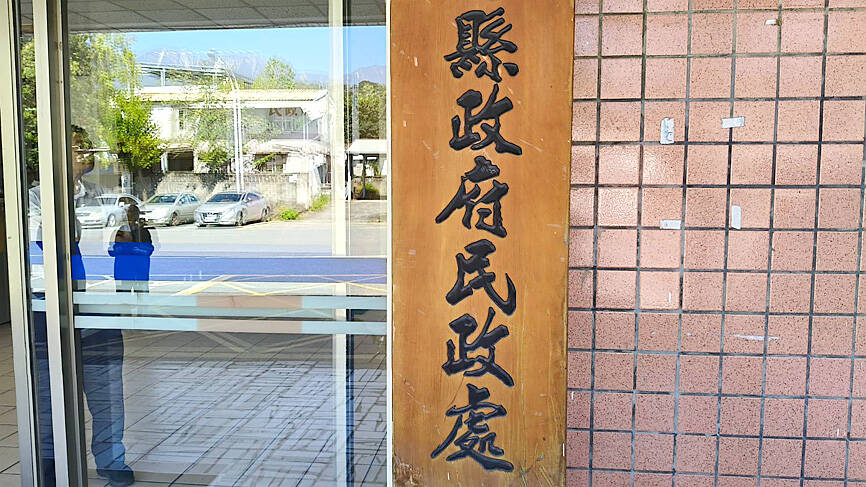Hualien County prosecutors yesterday searched offices and questioned 11 people in relation to accusations that the county government illegally sent representatives to people’s homes to verify their identity on a recall petition.
The controversy arose last month when a Hualien County resident said that a woman who claimed to be from the Hualien City Household Registration Office asked about her information on a recall petition.
The Hualien District Prosecutors’ Office yesterday said it had opened an investigation after receiving evidence reported to the Supreme Prosecutors’ Office last month.

Photo: Wang Chin-yi, Taipei Times
The office said it ordered the Investigation Bureau’s Hualien authorities to inquire about relevant documents from the Hualien County Election Commission and question personnel.
It said it came to the conclusion that Hualien County Civil Affairs Department Director Ming Liang-chen (明良臻) and other officials involved knew that verifying recall petitioners’ identities falls under the authority of local election commissions.
However, the commission did not entrust the Hualien City Household Registration Office to verify recall petitioners’ signatures, the office said.
Therefore, Ming and the other defendants allegedly misused personal data from the register of recall petitioners, while the household registration office was verifying petitioners’ household information as ordered by the commission, it said.
They are suspected of contravening articles 16, 41 and 44 of the Personal Data Protection Act (個人資料保護法), the office added.
Prosecutors yesterday ordered the Hualien County Investigation Station to search the county’s Civil Affairs Department and the household registration office to obtain evidence, it said, adding that prosecutors would continue to investigate neutrally and objectively.
The Chinese Nationalist Party (KMT) yesterday in a statement condemned the governing party for using judicial power to bar local election commissions from verifying recall petitioners’ identities as required by law.
According to Article 79 of the Public Officials Election and Recall Act (公職人員選舉罷免法), local election commissions should verify recall petitioners’ identities, including their name, ID and whether their signature is authentic, the KMT said, adding that verifying such information with petitioners in person is not prohibited by the act.
Given that the prosecutors’ office is interfering with the county government’s administration, concern has been raised over whether the Democratic Progressive Party is preparing to forge signatures in second-stage recall petitions and threatening local election commissions not to verify the signatures, the KMT said.
That would undermine the executive branch’s power to exercise its public authority and the nation’s legal system, it said, calling on the government not to bar public servants from enforcing the law to protect civil rights.

Right-wing political scientist Laura Fernandez on Sunday won Costa Rica’s presidential election by a landslide, after promising to crack down on rising violence linked to the cocaine trade. Fernandez’s nearest rival, economist Alvaro Ramos, conceded defeat as results showed the ruling party far exceeding the threshold of 40 percent needed to avoid a runoff. With 94 percent of polling stations counted, the political heir of outgoing Costa Rican President Rodrigo Chaves had captured 48.3 percent of the vote compared with Ramos’ 33.4 percent, the Supreme Electoral Tribunal said. As soon as the first results were announced, members of Fernandez’s Sovereign People’s Party

MORE RESPONSIBILITY: Draftees would be expected to fight alongside professional soldiers, likely requiring the transformation of some training brigades into combat units The armed forces are to start incorporating new conscripts into combined arms brigades this year to enhance combat readiness, the Executive Yuan’s latest policy report said. The new policy would affect Taiwanese men entering the military for their compulsory service, which was extended to one year under reforms by then-president Tsai Ing-wen (蔡英文) in 2022. The conscripts would be trained to operate machine guns, uncrewed aerial vehicles, anti-tank guided missile launchers and Stinger air defense systems, the report said, adding that the basic training would be lengthened to eight weeks. After basic training, conscripts would be sorted into infantry battalions that would take

GROWING AMBITIONS: The scale and tempo of the operations show that the Strait has become the core theater for China to expand its security interests, the report said Chinese military aircraft incursions around Taiwan have surged nearly 15-fold over the past five years, according to a report released yesterday by the Democratic Progressive Party’s (DPP) Department of China Affairs. Sorties in the Taiwan Strait were previously irregular, totaling 380 in 2020, but have since evolved into routine operations, the report showed. “This demonstrates that the Taiwan Strait has become both the starting point and testing ground for Beijing’s expansionist ambitions,” it said. Driven by military expansionism, China is systematically pursuing actions aimed at altering the regional “status quo,” the department said, adding that Taiwan represents the most critical link in China’s

EMERGING FIELDS: The Chinese president said that the two countries would explore cooperation in green technology, the digital economy and artificial intelligence Chinese President Xi Jinping (習近平) yesterday called for an “equal and orderly multipolar world” in the face of “unilateral bullying,” in an apparent jab at the US. Xi was speaking during talks in Beijing with Uruguayan President Yamandu Orsi, the first South American leader to visit China since US special forces captured then-Venezuelan president Nicolas Maduro last month — an operation that Beijing condemned as a violation of sovereignty. Orsi follows a slew of leaders to have visited China seeking to boost ties with the world’s second-largest economy to hedge against US President Donald Trump’s increasingly unpredictable administration. “The international situation is fraught